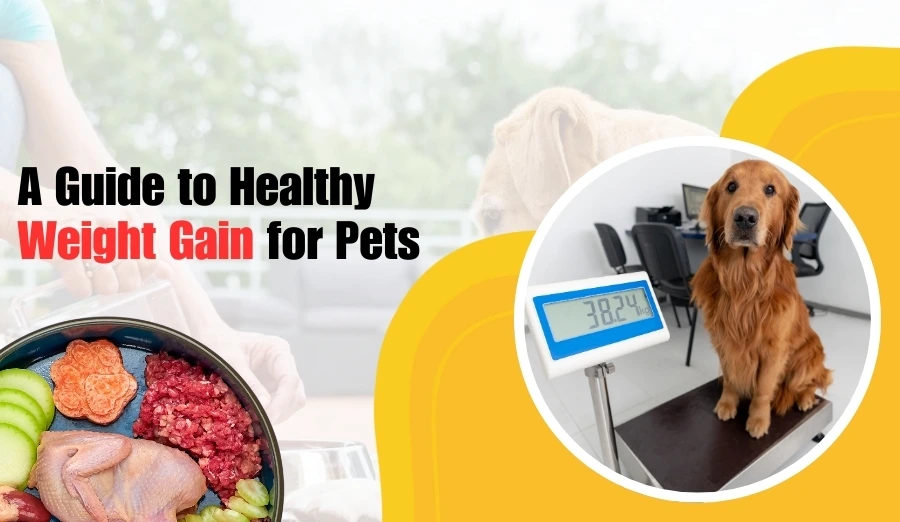-
Kutchina service center, Kolkata - 700010
Kutchina service center, Kolkata - 700010

Hello Reader!
Welcome to the blog page of APC Pet Clinic, one of the best pet clinic in Kolkata.
As pet owners, we strive to ensure our furry friends are healthy and happy. However, maintaining an ideal weight for pets can sometimes be a challenge. Whether due to illness, aging, or other factors, underweight pets need a tailored approach to gain weight healthily. At APC Pet Clinic, the best pet clinic in Kolkata, we understand the unique needs of pets and are here to guide you through the process of achieving healthy weight gain for pets.

Weight plays a critical role in your pet’s overall well-being. Pets who are underweight are at risk of weakened immunity, muscle loss, and reduced energy levels. It’s crucial to identify the underlying causes of weight loss and address them effectively. Healthy weight gain for pets ensures that they stay active, live longer, and avoid potential health complications.
Not all pets who are thin are underweight. However, some signs might indicate the need for weight gain, such as:
If you notice any of these signs, visit APC Pet Clinic, the best pet clinic in Kolkata, for a thorough health evaluation.
Before making any dietary changes, consult a veterinarian to rule out medical issues such as parasites, dental problems, or chronic illnesses. At APC Pet Clinic, we provide comprehensive health checks to determine the best course of action for your pet.
Feeding your pet high-quality, nutrient-dense foods is essential for healthy weight gain. Opt for:
Frequent, smaller meals throughout the day can be more effective than one or two large meals. This approach improves digestion and helps in steady weight gain for pets.
Add healthy, calorie-rich treats to your pet’s diet. Examples include:
Keep track of your pet’s weight and adjust their diet accordingly. Regular visits to the vet will ensure your pet is on the right track.

Overfeeding can lead to digestive issues and unhealthy weight gain, such as fat accumulation rather than muscle development.
Cheap, low-quality foods might provide calories but lack the essential nutrients for overall health.
While focusing on weight gain, don’t forget regular exercise. Physical activity promotes muscle development and keeps your pet active and happy.

Creating a customized weight gain diet plan for your pet requires careful consideration of their nutritional needs, preferences, and health status. Here’s a step-by-step guide to help you design an effective plan that promotes healthy weight gain for pets.
Before making any dietary changes, consult with your veterinarian or the best pet clinic in Kolkata. They can help you determine your pet’s ideal body weight and assess any underlying health issues that may affect their ability to gain weight. Your vet can also provide specific caloric intake recommendations tailored to your pet’s needs.
To create a weight gain plan, you’ll need to calculate how many calories your pet should consume daily. A general guideline for weight gain is to increase their current caloric intake by 10-20%. You can use the following formula to estimate your pet’s daily caloric needs:
Daily Caloric Needs=70×((Ideal Body Weight in kg) to the power 0.75)
This calculation provides a baseline that can be adjusted based on your pet’s activity level and metabolism.
Select high-calorie foods that are rich in protein and healthy fats. Here are some excellent options:
Instead of two large meals, consider feeding smaller, more frequent meals throughout the day. Aim for three to five meals daily, which can help improve digestion and nutrient absorption. Start with regular-sized meals and gradually increase the portion sizes based on your pet’s response.
Treats should be included in your pet’s daily caloric intake but should not exceed 10% of their total calories. Opt for high-calorie treats or use small portions of their regular food as rewards. This approach helps keep them motivated without compromising their diet.
Regularly monitor your pet’s weight to ensure they are gaining at a healthy rate—typically about 1-2% of their body weight per week is considered safe. Adjust the caloric intake as needed based on their progress. If they aren’t gaining weight, consider increasing their food portions or adding calorie-dense snacks.
While it may seem counterintuitive, incorporating light exercise can help stimulate your pet’s appetite and promote muscle gain rather than fat accumulation. Activities like short walks or play sessions can be beneficial.
Also Read: Expert Surgical Care For Pets and Their Health

To promote healthy weight gain in pets, it’s essential to choose high-calorie foods that are both nutritious and appealing. Here’s a list of some of the best options for achieving effective weight gain for pets:
Opt for premium dog foods specifically formulated for weight gain or designed for active dogs. Look for products that contain at least 22% protein and 18% fat. Foods labeled for puppies or working dogs are often higher in calories and can be beneficial for underweight pets.
Peanut butter is a favorite among many dogs and serves as a calorie-dense treat. It can be used as a topping on regular food or given as a standalone snack. Ensure you choose natural peanut butter without added sugars or xylitol, which is toxic to dogs.
Cottage cheese is an excellent source of protein and calcium, making it a great addition to your pet’s diet. Its low lactose content makes it suitable for pets that are lactose intolerant. Mix it into their regular food or serve it as a treat to help them gain weight healthily.
Adding cooked lean meats, such as chicken, turkey, or beef, can significantly increase your pet’s caloric intake. These meats provide high-quality protein necessary for muscle development and overall health. Always ensure the meat is cooked thoroughly and free from bones and seasoning.
Oily fish like salmon, sardines, or mackerel are rich in omega-3 fatty acids and provide a high-calorie option that supports healthy weight gain. Fish can be served cooked or canned (in water, not oil) to enhance your pet’s diet.
Both sweet potatoes and pumpkin are nutritious options that provide carbohydrates and fiber while helping with digestion. These foods can be added to your pet’s meals in mashed or pureed form to boost calorie intake without excessive protein.
Cooked eggs are a fantastic source of protein and healthy fats. You can scramble or boil them without any added oils or seasonings. Eggs can be mixed into your pet’s food or served as a treat to help with weight gain.
Look for treats specifically designed for weight gain, which are often higher in protein and fat content. These can be given in moderation to help increase overall caloric intake while rewarding your pet.
Incorporating wet or canned food into your pet’s diet can increase their caloric intake, as these foods tend to be more palatable and calorie-dense compared to dry kibble. Mixing wet food with dry food can also enhance flavor and encourage eating.

Portion control is a crucial aspect of managing a pet’s weight gain diet and plays a significant role in ensuring their overall health and well-being. Here are several reasons why portion control is important for pets, particularly when aiming for healthy weight gain:
One of the primary benefits of portion control is its ability to prevent obesity in pets. Overfeeding can lead to excessive calorie intake, resulting in weight gain and associated health problems such as diabetes, heart disease, and joint issues. By carefully measuring food portions, pet owners can help their pets maintain a healthy weight and avoid the complications that arise from obesity.
Portion control ensures that pets receive the right amount of nutrients necessary for their specific size, age, and activity level. Overfeeding can lead to nutritional imbalances, while underfeeding may result in malnutrition. By regulating portion sizes, pet owners can provide a balanced diet that meets their pets’ dietary needs without excess calories.
Feeding pets appropriate portion sizes helps maintain optimal digestion. Large meals can overwhelm a pet’s digestive system, leading to issues such as bloating or diarrhea. Proper portion control allows for better digestion and nutrient absorption, contributing to overall health.
Properly portioned meals provide consistent energy levels throughout the day. Overfeeding can cause lethargy and discomfort, while underfeeding may lead to weakness and decreased activity levels. By controlling portions, pet owners can ensure that their pets have the energy they need for daily activities without experiencing fluctuations in energy levels.
Portion control can also help manage behavioral issues related to food. Pets that are consistently overfed may develop unhealthy eating habits or become overly focused on food. By establishing a routine with controlled portions, pet owners can promote healthier eating behaviors and reduce food-related anxiety.
Regularly measuring food portions allows pet owners to track their pets’ weight more effectively. If a pet is gaining or losing weight unexpectedly, adjustments can be made to their diet based on their portion sizes. This proactive approach helps ensure that pets achieve their desired weight safely.
Consulting with a veterinarian about appropriate portion sizes is essential for creating an effective weight gain plan. Vets can provide personalized recommendations based on the pet’s health status, activity level, and specific dietary needs. This professional guidance is invaluable in achieving healthy weight gain while avoiding potential health risks.
At APC Pet Clinic, we are committed to providing personalized care for your furry companions. As the best pet clinic in Kolkata, we specialize in understanding your pet’s unique dietary and medical needs. Our experienced veterinarians work closely with pet owners to create effective strategies for healthy weight gain for pets. From tailored diets to advanced diagnostic services, we ensure your pet gets the best care possible.

Pets may lose weight due to parasites, dental issues, chronic illnesses, or poor diet. A veterinary consultation is crucial to identify the cause.
High-protein and high-fat foods, such as lean meats, eggs, and vet-approved weight-gain formulas, are excellent for healthy weight gain for pets.
Regular weigh-ins at home or the vet and observing physical changes, like coat condition and energy levels, can help monitor progress.
Yes, regular exercise helps develop muscle mass and healthily ensures your pet gains weight.
At APC Pet Clinic, we provide personalized care, advanced diagnostics, and tailored dietary plans, making us the best pet clinic in Kolkata for healthy weight gain for pets.
Helping your pet achieve a healthy weight is a vital part of their overall well-being. With the right diet, care, and guidance from the best pet clinic in Kolkata, you can ensure your furry friend thrives. If you’re concerned about your pet’s weight, don’t hesitate to reach out to APC Pet Clinic for expert advice and support. Together, let’s keep your pets happy, healthy, and full of life!